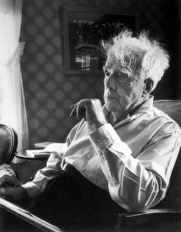Symbol
something that is simultaneously itself and a sign of something else. For example, winter, darkness, and cold are real things, but in literature they are also likely to be used as symbols of death.
Come In
Robert Frost
As I came to the edge of the woods,
Thrush music—hark!
Now if it was dusk outside,
Inside it was dark.
Too dark in the woods for a bird
By sleight of wing
To better its perch for the night,
Though it still could sing.
The last of the light of the sun
That had died in the west
Still lived for one song more
In a thrush’s breast.
Far in the pillared dark
Thrush music went—
Almost like a call to come in
To the dark and lament.
But no, I was out for stars;
I would not come in.
I meant not even if asked;
And I hadn’t been.
The poem “Come In” by Robert Frost is about the contrast of nature as well as the general darker and lighter side of life. Frost uses “stars” to symbolize the lighter side of life, while the “thrush” symbolizes the darker side of life. Frost sets it up perfectly for contrast by putting the persona between the dark woods and the dusk. The restriction of the thrush, “too dark in the woods for a bird by sleight of wing”, implies that we are restricted in ways when we are feeling the darker side of life. There is optimism and “light” hidden in the dark, and there are means of escaping these restrictions by using given power.

"A bank is a place where they lend you an umbrella in fair weather and ask for it back when it begins to rain." ~Robert Frost
Robert Frost

Robert Lee Frost was born in San Francisco on March 26, 1874 to Isabelle Moodie, a Scottish schoolteacher, and William Prescott Frost, Jr., a journalist, local politician and ancestor of Devonshire Frost who had sailed to New Hampshire in 1634.
Frost's family lived in California until his father had died when he was just eleven. He moved with his mother and sister to Lawrence, Massachusetts to live with his paternal grandfather.
In 1892, Frost graduated from high school and attended Dartmouth College and was a member of the Theta Delta Chi fraternity. While attending college, Frost's first poem, "My Butterfly: An Elegy", was published in the New York Independent, which earned him $15, and had five poems published privately in 1894.
In 1895, Frost married a former schoolmate, Elinor White; they had six children. Frost then became a teacher and continued publishing his poems in magazines to support his family. From 1897 to 1899, Frost attended Harvard, but failed to receive a degree. The couple moved to Derry, New Hampshire, where Frost worked as a cobbler, farmer and teacher at Pinkerton Academy and a state normal school in Plymouth.
As the couple grew tired of farm life, they needed a change. Robert wanted to move to Vancouver and Elinor England, so England it was. In 1912 the couple sold their farm and moved to the Gloucestershire village of Dymock, where Robert became a full-time poet. The next year, A Boy's Will was published. The book received international fame and contains many of Frost's best-known poems: Mending Wall, The Death of the Hired Man, Home Burial, After Apple-Picking and The Wood-Pile. While in England, Frost made notable contacts with fellow poets as Ezra Pound (who gave Frost his first favorable review by an American), T.E. Hulme and Edward Thomas.
Frost returned to America in 1915 and bought a farm in Franconia, New Hampshire to farther his career in writing, teaching and lecturing. From 1916 to 1938, Frost worked as an English professor at Amherst College. He encouraged his students to bring the sound of man to their writings. Also in 1916, Frost was made a member of the National Institute of Arts and Letters and published his third collection of verse, Moutain Interval.
In 1920, Frost purchased a farm in South Shaftsbur, Vermont. Robert's wife died in 1938, followed by four of his children. He suffered from long boughts of depression and continual self-doubt. After the death of his wife, he employed Kay Morrison, who he became strongly attracted to. One of his finest love poems, A Witness Tree, was composed for her.
During the inauguration of President John F. Kennedy, Frost recited one of his poems, The Gift Outright. Robert also represented the United States on several other official missions. He became known for his poems that interplay voices, such as The Death of the Hired Man, and received numerous literary and academic honors.
Robert Lee Frost died on January 29, 1963 and is buried in the Old Bennington Cemetery in Bennington, Vermont.
(http://www.poemofquotes.com/robertfrost/)
